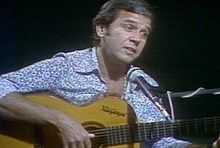Carlos Lyra

Carlos Lyra is a Brazilian singer and composer of numerous bossa nova and Música Popular Brasileira classics. He was born on May 11, 1939. He and Antonio Carlos Jobim, were the first two music composers, together with lyricists Vinicius de Moraes and Ronaldo Boscoli, to be recorded by João Gilberto on his first LP entitled Chega de Saudade (1959), which was called the first generation of Bossa Nova.
His first song to be recorded was "Menina" (1954), issued as a single by Sylvia Telles in 1955, with "Foi a noite" by Antonio Carlos Jobim on the other side of the record. The writers first met because of this single, when Jobim called Lyra "the other side of the record". At that time, both were writing their own music & lyrics creating a coloquial and completely new style. They wrote about their own experiences and feelings. A completely different lyrical style from most songs written that time.
His first compositions (music &lyrics), from 1954 to 1956 included: "Quando chegares"; "Menina";" Barquinho de Papel"; "Ciúme"; "Criticando" and "Maria Ninguém". In 1957 he started to compose together with the lyricist Ronaldo Bôscoli, songs such as "Lobo bobo", "Saudade fez um samba" and" Se é tarde me perdoa". In 1958 wrote "Aruanda" and "Quem quiser encontrar o amor", with Geraldo Vandré. In 1960 he started to compose together with Vinicius de Moraes, songs as "Você e eu"; "Coisa mais linda", Sabe você?", "Samba do Carioca"; "Maria Moita" and many others. They wrote together a musical play, in 1962, called "Pobre Menina Rica" (Poor little rich girl blue).
In 1961 he was one of the five founders of CPC (Center of Popular Culture) where he started to write songs for cinema and theater. He also wrote the song "Influência do Jazz", one of the songs he sang at the Bossa Nova Concert at Carnegie Hall, in 1962.
He continues to compose, record, and perform today.
Lyra's most famous compositions include "Coisa Mais Linda", "Você e Eu", "Maria Ninguém" (once claimed by Jacqueline Kennedy to be her favorite song),[citation needed] and "Influência do Jazz".
Quote
Referring to Tom Jobim's song, Samba do Avião (Song of the Jet), where it says "My soul sings / I see Rio de Janeiro", he said that his soul only sings when he gets into the South Zone of the city - region where lies all the Rio's famous beaches. He was specifically referring to coming out of the Rebouças Tunnel. Rebouças is a major tunnel that links the North to the South Zone of Rio de Janeiro.
External links
- http://www.carloslyra.com (Official Site)
- http://www.dicionariompb.com.br/carlos-lyra
- http://www.myspace.com/carloslyra
|